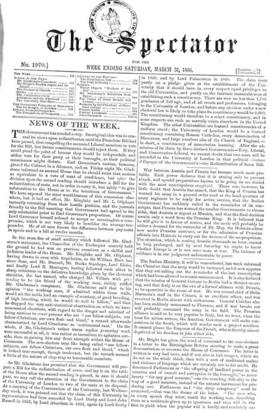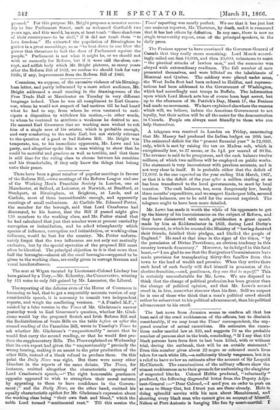Mr. Bright has given the word of command to the
non-electors in a letter to the Birmingham Reform meeting to make a great. demonstration to overawe the House of Commons. The letter is written in very bad taste, and if not also in bad temper, which we do not on the whole think, then with a sort of meditated malice and violence of language which are certainly not to his credit. He denounced Parliament as " the offspring of landlord power in the counties and of tumult and corruption in the boroughs," as never hearty " for any good measure,"—as the standing difficulty in the way of a good measure, instead of the natural instrument for pro- ducing one. Parliament and "the dirty conspiracy" must be
overawed,—that was the theme of the letter. The men who, in every speech they utter, insult the working men, describing them as a multitude given up to ignorance and vice, will be the first to yield when the popular will is loudly and resolutely ex-
pressed." For this purpose Mr. Bright proposes a monster assem- Times' reporting was nearly perfect. We see that it has just lost bly to line Parliament Street, such as welcomed Garibaldi two one eminent reporter, Mr. Thornton,, by &ebb, and it is rumoured years ago, and this would; he says, at least teach " these slanderers that it has lost others by defection. lin any case,. there is now no single trustworthy report, even of the principal' speakers, in the daily press.
of their countrymee- to be civil," if is did not teach them " to love freedom." He exhorted the population of Birmingham to gather in a great assemblage, so as " to beat down in one blow the power that threatens to bolt the door of Parliament against the people." Parliament is not what it might be, or we should not wish so earnestly, for Reform, but if it were still time core rapt, and selfish body which Mr. Bright pictures, so- many years after the Reform Bill of 1832, we confess we should' look for very- little, if any, improvement from the Reform Bill of 1866.































 Previous page
Previous page